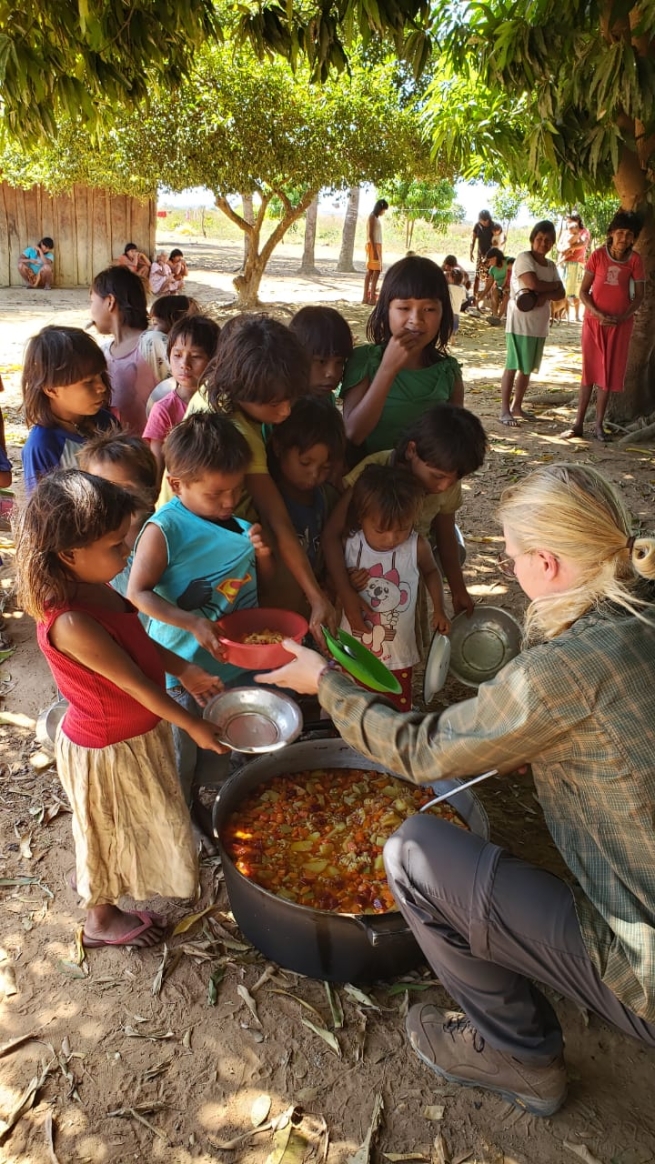However, two indigenous children were admitted to the Indigenous Health Home (CASAI) to provide them with better accompaniment, while the others remained in the village and recovered thanks to the guidance and help offered by the Children's Pastoral Team.
The Children's Pastoral Care team includes Salesian Deacon José Alves, CASAI nutritionist Delma Cristina, indigenous manager Djanira Ro'ojadwe Tsi'ewadi, and Belgian volunteer Dieter Willems.
In addition to the initiatives in the village of Santa Fe, the Belgian volunteer participated in activities with the AMA (Mobile Missionary Assistance) project team, coordinated by the teacher Luís Würstle, who was in Campinápolis these days to provide maintenance for artesian wells in several villages in the area.
Dieter, an economist, spent about a month in the indigenous lands of Mato Grosso, accompanying missionary activities and realizing that little is needed to make people happy. "We served a simple soup and the children, who had no cutlery, plates, or a table, were already very grateful and happy for the food," he said.
The experience of volunteering with the Xavantes Dieter shares with Italian pulmonologist Paolo Fior, who as part of the project started more than 50 years ago by the unforgettable Fr. Ugo de Censi, "Operation Mato Grosso," collaborated with the Salesians at the Campinápolis mission for a month in June.
"My experience has been to be with people, especially the Xavante people. I've been helping out at the health center because they really need to be accompanied for many of the diseases they are affected by. There are many children in the villages who need it, also their access to health care is complicated, so it's a good thing to be able to help them in their own villages themselves," the doctor explained.
Dr. Fior then added that taking care of the health of indigenous people is a way to help preserve the culture of the people. "Because a Xavante who eats well, who is healthy, is a Xavante who will perpetuate their way of life, their culture. And this is what Operation Mato Grosso and the Salesians are working for."
During his volunteer service, Dr. Fior also had the opportunity to participate in the "celebrations" held in the Xavante villages on the occasion of the Feast of Corpus Christi last June 16.
And although the liturgical work of the Salesians in that reality did not include flower displays, processions, or incense, it was of great praise to God. For with the words of the Gospel in mind ("Verily I say unto you, as often as ye have done these things unto one of the least of these my brethren, ye have done it unto me" - Mt 25:40) and a great desire to help the community, they donated baskets with essential foods and clothing to the poorest and hungriest children.
It was on that occasion that the children had been measured and weighed, and each family had received at least one basket of food and all the villagers had shared a meal prepared by the volunteers. "I realized that this work is very important. It is also very important for the city of Campinápolis to know that there are people who go all the way to the very last village to give them some attention as well," the Italian volunteer adds further.
He ends by adding, "We prepared food for them to show that there are people, there are 'Waradzu,' as they say, who care about them, who care about their health, who like them as Xavantes and as people; because no one, whether 'Waradzu' or Xavante, should go hungry or be in need."
https://www.infoans.org/en/sections/news/item/15770-brazil-salesians-and-volunteers-among-indigenous-people-to-share-bread-feed-the-hungry-heal-the-sick#sigProId05d891e326



